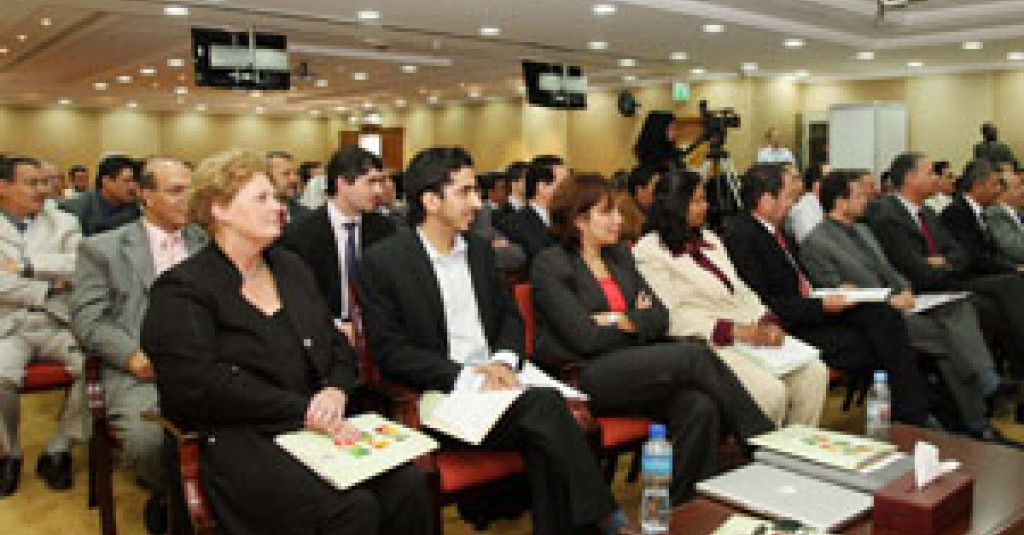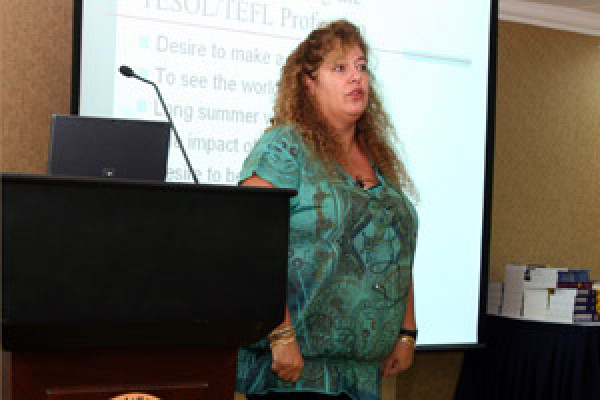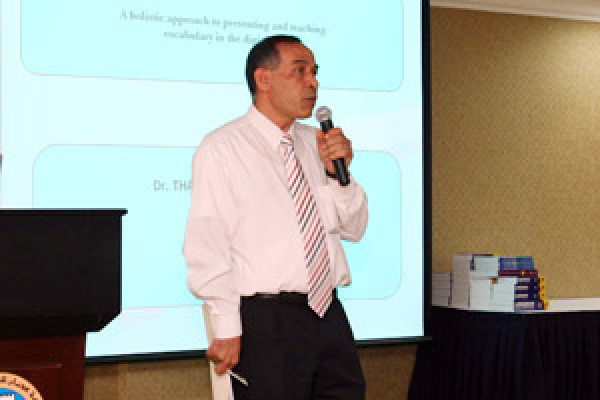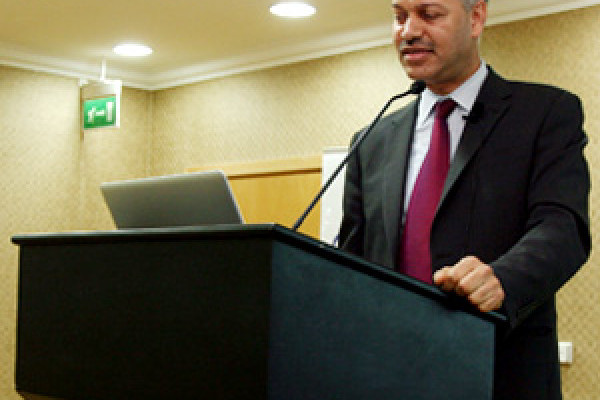Teachers Attend Digital English Language Teaching Symposium at Ajman University’s Fujairah Campus

Ajman University of Science & Technology (AUST), Fujairah campus, has held a symposium on “Developing English Language Teaching for the Digital Age,” which was attended by AUST Vice Presidents and Dr. Hamdi Al Shaer, Director of AUST’s Fujairah Campus, and English language faculty members in addition to 235 English teachers from a number of Emirates, cities and educational zones in the UAE, including Ajman, Fujairah, Khor Fakkan, Ras Al Khaimah, Um Al Quwain, Kalba and Sharjah. Also participating were linguistic experts and e-Learning practitioners from AUST, American University of Sharjah, Higher Colleges of Technology, the Ministry of Education and educational zones, the British Council, and representatives of a number of companies including Promethean, Pearson Longman, Human Logic and Dubai House. Symposium activities included 13 lectures and a variety of workshops.
The symposium began with the UAE national anthem and a recitation of verses from Holy Quran, followed by a speech by Dr. Ahmed Ankit, AUST Vice President for External Relations and Cultural, on behalf of HE Dr. Saeed Salman. In his speech, Dr Ankit commended the continuing support of His Highness Sheikh Hamad Bin Mohammed Al Sharqi, Member of the Supreme Council and Ruler of Fujairah, and his encouragement for all those who have contributed to the development of the emirate and the UAE overall under the leadership of the UAE President, His Highness Sheikh Khalifa Bin Zayed Al Nahyan. Dr. Ankit added that the selection of the symposium’s topic accords with the growing use of digital technology and modern interactive tools in teaching methods. He stated that the focus on English stems from its being the language of instruction in most programs and disciplines in higher education, in addition to the fact that its mastery has become a compulsory requirement for those wishing to enter higher education. This necessitates the improvement of English teaching methods in primary and secondary education so as to enable high school graduates to attain a minimum level of English language proficiency and obtain a certificate of English competency. This factor, however, increases the onus on English teachers. Dr. Ankit also stated that the university, through its plan to deliver all programs electronically by 2011, believes that the empowerment of teachers electronically and technologically will promote the increase in quality of the teaching process and thereby reflect positively on learning outcomes. Dr. Ankit concluded by thanking the directors of district schools for their cooperation, and invited attendees to visit the book fair that accompanied the conference.
Dr. Tharwat EL-Sakran, faculty member at the American University in Sharjah, presented an integrated approach for teaching vocabulary, giving examples of student vocabulary synonyms and their wrong use due to a lack of familiarity with context words, verbal synonyms, and multiple meanings of single words. He also highlighted the problems of pronunciation of English words for Arab nationalities in particular, which affects student production of sentences, exiting expressions and freedom in sociolinguistic education.
Dr. Marwan Al Saifi of the Ajman Education Zone spoke about the position of English language teachers who have attended training and professional development courses. He pointed out that his research, which targeted 40 English teachers, showed that some teachers feel that they do not need professional development, and others that they do not benefit from training courses. In addition, some also complained that the content of such courses was not sufficiently related to their needs as teachers, while others considered training courses to be very important but that the increasing burdens placed on them as teachers prevented them from attending. There was also a feeling that more qualified, experienced and efficient trainers were needed. Dr. Al Saifi recommended the carrying out of a detailed study of the real needs of teachers in general, and English teachers in particular; he also recommended the exchange of experience in the field of training and development between all educational areas in the UAE.
Dr. Christine Coombe, faculty member for the Higher Colleges of Technology, gave a presentation on the specifications of model teachers, providing 10 general specifications which indicate teacher excellence while at the same time preserving teacher enthusiasm. She added that those involved in education need to make a greater effort to challenge the prevailing stereotype of the teacher. On the evaluation of faculty members by students, she stated that it focuses largely on the personality of the teacher rather than performance. She pointed out that not every teacher is necessarily capable of being an effective communicator; English teachers need to familiarize themselves with the culture of the country in which they teach in order to communicate effectively with their students. She pointed out that Arab teachers in the UAE are better placed in this regard.
During the eight parallel workshops, English language teachers from a number of institutions discussed their experience in teaching. Rozitah Abu Samah and Sarita Cummins of the British Council talked about the importance of using modern interactive teaching tools, including video, images, electronic links and other tools that benefit English teaching and help the student understand more quickly due to familiarization with digital communication. Mr. Hamed Halawani from Human Logic spoke about the importance of electronic solutions in the teaching of various courses in educational institutions, stating that academia is undergoing a technical revolution that will ultimately lead to the adoption of e-learning systems by all educational institutions, which will complement rather than negate current teaching methods.
Mr. Majeed Sharaf, Promethean Vice President in the Middle East, spoke about interactive whiteboard technology, highlighting its benefits and advantages and the importance of its use in education. He stated that it will help students to realize real benefits and gain information in a smooth and effective way.
Dr. Ahmad Dabbagh, Assistant Professor, Head of the Department of Multimedia and Web Development and Academic e-Services Director, said that e-learning via the use of Moodle has played an important role in many universities. AUST has developed more than 500 courses which feature electronic interaction with 5,000 students. Dr. Dabbagh provided a live demonstration of how to teach through this e-learning system, showing how students can benefit from sharing files and courses securely at any time from any place via the Internet.
Miss Julie Stack, English Language Teaching Consultant, Pearson Longman, demonstrated a company program (IWB) which helps in teaching English in primary schools via computers. She showed the capabilities of the program and in particular how it supports sounds, images, and video clips which make lessons more understandable and interesting for pupils. She concluded her presentation by talking about the possibility of developing this program for use in middle and high schools.
At the end of the symposium, Dr. Edwin Wyllie and Dr. Ibrahim Saad, symposium coordinator, presented participation and appreciation certificates to the audience and speakers as well as a number of awards of dictionaries and books on English teaching donated by Pearson Longman. Dr. Wyllie promised that similar events will continue in line with continuing developments in education and technology.


